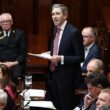IN THE past we typically used the word solidarity to describe working people coming to each other’s assistance against the background of a strike or a community struggle. It was often used also in the context of appeals for funds to assist poverty stricken people hit by terrible natural disasters in the Third World.
In the last five months since the onset of the catastrophic financial and general economic crisis we have heard the word solidarity repeated a lot. But in the strangest way and in the most unlikely quarters.
Speaking very recently on Pat Kenny’s RTE morning radio programme the leader of IBEC, the organisation of big business, Turlough O’Sullivan, called on working people to show solidarity during this crisis. Taoiseach Brian Cowen, speaking to hundreds of business people at a Dublin Chamber of Commerce dinner, repeated this.
However, in this use of the word solidarity, they are inflicting as serious an assault on the correct meaning of words in the English language as ever former US President George Bush could manage. For solidarity now means the opposite of what it says in the dictionary.
Solidarity in the mouths of big business representatives and their paid political hacks means that the weaker must be forced to come to the assistance of the stronger, the poorer to the richer and the victims to the perpetrators of the crime.
Solidarity means that nurses, Council road sweepers and canteen staff in public hospitals must endure savage cuts in their wages, under the guise of a pension levy, to pay for an economic crash caused by the profiteering and reckless financial gambling by millionaire and billionaire speculators, developers and bankers.
What is remarkable is the shamelessness of the representatives of big business and right wing politicians in standing before the country and demanding that millions of ordinary working people pay for the crisis which their activities have inflicted on the economy. They do this without even an attempt at an apology for the wreckage they have caused in society.
Even more remarkable is how slavishly journalists repeat the propaganda of the establishment and become virtual spokespeople for them. And not just in the billionaire owned media.
RTE’s Morning Ireland, which is the most listened to radio programme in the state, is particularly persistent in reflecting the propaganda and excuses of the establishment and government. A few days ago one of the main presenters, Aine Lawler, vehemently denounced ESB workers who had been given a modest pay increase of 3% agreed last year. “Where was their sense of solidarity with private sector workers who are losing their jobs?” she indignantly demanded.
The following day it was an entirely different tone as the same presenter played us six minutes of a speech made the night before by Taoiseach Cowen to the Dublin Chamber of Commerce. Critical faculties evaporated as she gushed over the tape.
Cowen appealed for solidarity to enable the country to come out of the disaster in which it finds itself. He was speaking to an assembly which included some of those whose gross speculation and profiteering in the property and banking sectors triggered the crash that has devastated the public finances.
Brian Cowen was a senior leader in the governments which connived with those speculators, endorsed their profiteering and legislated for their greed. He is as guilty as them for the catastrophe. Surely any journalist worthy of the title would, in these circumstances, be asking why this kind of sheer cynicism and hypocrisy should be greeted with anything other than fury and indignation by the big majority of working people who are now expected to pay the price for the activities of Fianna Fail and their speculator friends?









